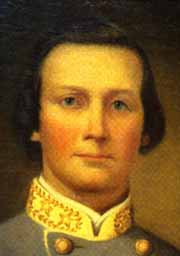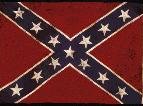South Carolina
C.S.A.


South Carolina
C.S.A.
|
South Carolina C.S.A.
|

|
|

|
South Carolina C.S.A. |
|
Company H Sixteenth South Carolina |
|
Probably the most germane and forceful question about the War Between the States today, in history, politics, and social science is, Why did the South fight, and What did they fight and die for? Today's world seems unwilling or unable to accept the simple words of the men who fought and as always, the academics of the ivory tower are intent on showing self-worth by vaunted studies about yeoman farmers and planters and slavery. The individual is left completely out of the equation because the individual makes the equation too complex. The acdemic mind seeks and needs to reduce that individual to a cultural stereotype to support their particular bias. Today, this point of view or bias must always support a liberal humanistic global society, at the expense of the individual. As always, academics tend to hear hoof beats and look for zebras, when horses are a much more likely choice. To me and to most men of common sense, the truth is very simple. These sons of the South fought; first of all, because of the place they found themselves in time and history. Just like us, they were a product of the world that came before and were armed with no absolute knowledge of what would follow. The first rule of the past is never place your values on men from another time and place. Secondly, the southern farmer fought to preserve what he felt were his rights. First and foremost among those rights was the right of self-determination; second was the right to determine who governed and how they governed. Southerners championed that cause as well, and it was not distant, less than one hundred years had elapsed between the Revolution and this, their war. Vaunted academic studies aside, the southerner fought because he did not wish to be subjugated to a rule or a way of life that was not of his choosing. What did the private soldiers of the Sixteenth South Carolina say about why they fought? Very little, but when they did express feeling about themselves, they said they fought to be just that, independent and free. "Don't Tread on Me" rings throughout southern history. Remember that the south was not the invader, and did not move, even into Maryland until Sharpsburg. The Southerner fought and died on his soil, by choice before Sharpsburg, by need after 1863. Here are some of the recorded thoughts of the men and women who were involved with the Sixteenth South Carolina. M.M Brown when writing to Lt. Goodlett said this, "I am in hope that time is not ere long when our dear brave heroes can prove to this tyrannical invader that we are an independent people, who can never be subjugated only by our equals and they have never yet existed." She was to be sadly disappointed, as was the entire south. Sergeant James Hunt said this, "A great (many) are out of heart of ever gaining our independence but I hope for the better." Sergeant Hunt would not live to see his disappointment bear fruit. Others like Captain Holtzclaw had ideas that were lofty but still center around the concept of self-determination. In searching for an answer to this question, especially for the men of the Sixteenth, we find a total lack of clarity, which reflects a truly democratic notion of life. It was a war of millions of causes, because so many served and were touched by it. Today even this is hard to understand when we are approaching our Brave New World of the Twenty-first Century. In the Upper end of Greenville County the division brought on by these democratic notions is especially sad. Many of these men were avowed Unionist and it was especially hard for them to break with their love of a united group of states and many did not. The brother of Jackson Burrell of Company H simply refused to go. He said this, "I spent the war running the mountains with my little 'fiest' dog, they got the dog but they never got me." Yet we find his brother serving faithfully with the Sixteenth. Both returned to the mountains to live and die in peace after the war. Many left with the intent of reluctantly serving and died of measles, camp fever, and a host of illnesses, long before seeing battle. Some went to war and deserted to come home only to be hunted down and shot like Wm. Peahuff. Others met more brutal ends in quiet mountain coves and the still meadows of the dark corner. By the end of the war, the mountains were in flames. "Outliars," "Tories," and deserters rode the high narrows, living in caves and fighting openly with Confederate authorities. At one point in 1864, we find the Confederate Military Authorities in Greenville petitioning for cannon to drive deserters and outlaws from a Revolutionary War blockhouse they had occupied. Union prisoners of war who escaped and passed through the mountains spoke of men wearing bearskins with head and teeth intact and claws extended while living on wine and silver, under the eyes of stolen portraits, plundered from the summer homes of the wealthy at Flat Rock. We have men on medical leave deployed under Lt. Kendrick and others moving into the Gowansville area and across the mountains to suppress these outlaws. One of the Dill boys was shot down and killed, virtually in his own back yard, while on medical leave for wounds suffered in the fighting for Atlanta in the service of Lt. Kendrick. We have incidents like the one where Wm. Peahuff was hunted down and shot. Other incidents even more brutal in nature were carried out by the command that killed Peahuff. In the Garrison family letters, we find mention of great fear about the "Tories" from the mountains and Wat's concern that Eppy Hightower has gone over the hill and to ground in the mountains. So the question remains, Why did they fight?
For me, that answer is clear and simple and resonates throughout American and English history and I have never seen it better expressed than in the photograph that it is my pleasure to present here. They fought for one reason! To preserve what you see pictured here. William Perry Middleton (Seated Center) fought for this and this alone. He fought for the children you see in this picture and for the ladies around him. He fought for the split rail fence and the right to build it as he pleased without government regulation telling him how high, or wide, or long the fence could be. He fought for the right to display his flag and determine how he would live and how he would die. It is that simple, always has been, and always will be. There is nothing more to be said, save this, he and those like him will not be forgotten as long as one man, woman, or child, with the spirit of freedom that South Carolina embodies, lives, walks, and breathes. You can burn your flag and tear down his, but you cannot dishonor his honest, innocent, and simple service or the service of my family members who were just like him, and neither will I.
|
 |
|
Dave and Wendy Dave is a descendant of Private William Perry, Middleton, Company H, Sixteenth South Carolina Seated at the Center of the photo. Also pictured are-left to right- Spurgon Middleton, William Perry Middleton(seated), William Charlie Middleton stands next to Eva Middleton Wade, Marinda Ballew Middleton(seated), and Lula Middleton Batson (out of picture). Taken in Glassy Mountain "The Heart of the Dark Corner" March 4, 1885 E-Mail Descendant |

|
|

|
|